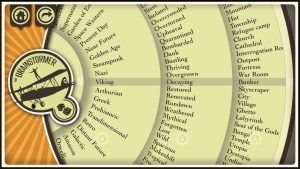How are you going in Nanowrimo so far, a week in? I have to admit, I am struggling a bit. It’s very hard to find time while caring for my toddler, who is currently refusing her day naps.
It’s at times like this when I like to fall back on writing prompts to help me through. Even if I can only fit in a few words here and there, at least I am making some progress.
Last week I mentioned my favourite tool for Nanowrimo, the Plot Whisperer Book of Writing Prompts, but this week, I want to give you some further examples of Nanowrimo prompts which you can use to help get your words out.
Prompt 1 – Monday
Firstly, think about your Main Character.
- What is it that he or she wants most of all?
- What are they willing to do to get it?
- Who or what is getting in their way?
Use these questions to write three scenes or paragraphs of description, action, dialogue, or backstory.

Here is an example, just off the top of my head: perhaps your main character desires freedom from his tumultuous current relationship. His wife is emotionally abusive. But he doesn’t want to leave her and feels he can’t.
- Write a short scene portraying these feelings, his desire for freedom and safety, in whatever form comes to you first. Let the words flow out; let the scene unfold before you and see what happens.
- Next, write a scene about what he could be willing to do to achieve this, if he was really pushed… For example, perhaps he would only finally leave her if she was physically violent. And what lengths would he go to, to gain his freedom? What if they had a child together, and she threatened the child? Perhaps he could even go to the extreme of killing his wife, in the protection of his child. Follow your own path, and write whatever comes up.
- Thirdly, write about the person getting in his way; his wife. Devote a paragraph or scene describing her and her tormenting actions and abuse. What word’s does she use? What images does she invoke, and feelings and emotions?
Now, this exercise might have resulted in little of your actual novel being written; but it will have provided you with multiple ideas going forward for your next few writing practices.
Just from this example alone, I could create the following plot points to fill out my novel, just off the top of my head, so no judging me here 🙂
Plot Points developed from Character Prompt/Exercise Above:
- A scene near the beginning that portrays the wife’s emotional violence. Her cutting words. We see her breaking down her husband.
- A scene where we see and feel the torment and hopelessness the husband feels, perhaps following on from the scene above, or at another point in the novel.
- A scene where the wife threatens her child, at which point, her husband finally fights back, perhaps killing his wife, or seriously injuring her.
Prompt 2 – Tuesday

Today, I would like you to focus on your antagonist. What is it that they desire?
Write a scene which will progress your novel forward focusing on your antagonist and her desire and what she’s doing to achieve it. Show us how it interferes with your main character.
Prompt 3 – Wednesday
Today, I would like you to think about description and narration in your novel. Who is your narrator? Are they telling us all there is to see?
Using your narrator, take your next scene and expand out the description as you go through the scene. Feel free, this one time, to go overboard and be as creative and flowery as you like.
If you are anything like me, you might tend to under-write your scenes, taking Hemingway’s advice way too much to heart. Take today to be as poetic and creative as you like. Try to over-write for a change. But don’t force it, just be open to being more flowery than you normally are:)
Prompt 4 – Thursday
Today, I would like you to think about your novel’s ending. Where is your story headed? Can you see the ending, have you thought about it before? Sometimes, well, most of the time, I believe knowing where your going can be tremendously helpful in planning or plotting your way to get there.
If you know your ending, you’ll be able to structure out all the important plot points that your protagonist needs to achieve and you need to write to get there. Knowing the ending will definitely give you your beginning. And vice versa. If you have a clear idea of how your story starts, then this will give you a big clue in how your story could end, or at least how your main character might be transformed. It still might not give you the climax or exact plot points, but at least you should understand your protagonist’s internal character arc.
- So, if you haven’t already, brainstorm your novel’s ending and your main character at the end. Do this for 10 minutes at least.
- Then, use this information to create a scene for somewhere in the beginning of the story, in Part 1 of your novel.
For example in my quick and dirty story example from above, perhaps at the end, my protagonist is driven to murder. He

might murder his wife in cold blood. From my earlier work above, I can see the scene where he injures her when protecting his child, but perhaps that isn’t enough for him to actually leave her. Perhaps, the only way, for some reason, which I haven’t uncovered yet, for him to truly escape and have freedom for his daughter and himself, is to murder his wife. And he does this in cold blood.
If this is my ending or my climax, how could I write the story to show his complete transformation?
- He starts weak and downtrodden. But he snaps into action when his wife starts abusing their baby daughter too.
This gives me many ideas for beginning scenes, but the story is becoming quite dark, so I might leave it here.
Prompt 5 – Friday
The above prompts or exercises will have probably provided you with enough inspiration to get your through the rest of the week, so I won’t give you any more detailed prompts here. For the rest of the week, I give you interesting words, which I challenge you to include into your story somehow, and if you’re still struggling for scene ideas, use these words to create a scene around which fits into your story logic somehow. Good luck!

Traitor, Dying, Farmer. Use any, or all of these words, to build a scene around (from The Brainstormer app)
Prompt 6 – Saturday
Wizards, Grass, Luggage, Sadness, Destruction (from the Ideas for Writing app)
Prompt 7 – Sunday
Awful, Squash, Quill, Painstaking, Suppose (from the Writing Prompts app)
I hope you enjoyed these prompts, and that they help you to reach your writing targets this week. I’d love to find out what works and what didn’t work for you. Please let me know in the comments below, and I’ll respond as soon as I can.
Need Further Writing Resources and Prompts? Check Here To See My Recommended Resources List, and Here to See My Recent Nanowrimo Posts.
Happy Writing!
Erica

Hi there,
Many thanks for this interesting and informative post. This is a topic that will have a lot of visitors, I suspect, as its something that will happen to most writers and bloggers at some point in their lives.
I think your approach is perfect in that you have broken down the task into manageable segments.
This way, you can return to each section or subject, if you think of something interesting that would add to the plot or story.
Its a great idea and many thanks for posting these helpful tips and ideas.
Continued success,
Cheers PB
Hi Phil, I’m glad you liked them. Thanks for reading!
I really enjoyed reading about the prompts you use to drive your novel forward. I specialise more in writing e-books but a lot of the points you made are relevant to any kind of writer. What was especially helpful is that there are ways to combat Time management problems we all have when we have families. I wonder how we can find other ways to manage our time more efficiently and still write as much as we want. Any tips?
Iain, thanks for your comment, and I apologise for taking so long to get back to you. I agree, no matter what sort of writing you’re undertaking, time management tricks apply to us all:) Have you thought about writing 300 words a day?
I first read about this in a Wealthy Affiliate blog post actually, and it was written for non-fiction writers, but it totally works for fiction writers too. The key is to write only 300 words per day, every day. This should stop you from burning out. When I’m writing articles, this method is great, and I’ll get two articles written every week, if I stick to it:) If you need to write more each week, I’d just increase the number of 300 word sessions you do each day. This also smartly works out to about 10-15 minutes worth of writing, depending on how fast you write, so it’s also very achievable. Best of luck!
Erica